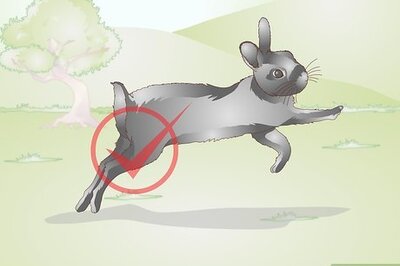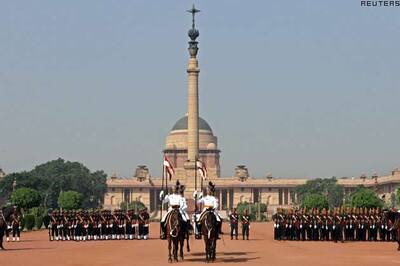
views
Srinagar: Before the crack of dawn, Moazum Mohammad had reached Jammu, driving nearly 600km overnight from Delhi.
A journalist based out of Srinagar, Moazum didn’t take rest after the strenuous 12-hour drive.
It was after six days that the road to Kashmir was opening and he thought to drive home straight.
On January 21, Kashmir Valley and the mighty mountains surrounding it received heavy snowfall and a white carpet was spread all over.
In such situations, Kashmir has no surface connection with the rest of the world. The Srinagar-Jammu highway, which is the main lifeline of the Valley, gets blocked.
The usual avalanches and landslides hit the highway and on certain stretches there was 6-feet high snow.
Hundreds of passenger cars, supply trucks and Army convoys came to a halt. At places, locals left their vehicles and started walking on foot towards their homes. Some of them complained there was no help in sight.
The 270-km highway goes through high-mountain passes, tunnels and areas carved like a cave from hills, stretches that remain prone to shooting stones. At places beyond the edge of the road there are 1,000-feet deep gorges.
The curves, slopes and rough trails sometimes leave commuters travelling in the harsh winter sick.
The supplies in the Kashmir Valley too had dried down. According to reports, a day’s closure of the Jammu-Srinagar highway costs the Valley’s economy nearly Rs 100 crore a day.
In past two months, the highway has remained closed for over 20 times.
When Moazum crossed the Jammu city and reached its outskirts he witnessed a sea of vehicle.
“There were trucks and cars spread over kilometres,” said Moazum, who had to manage through sluggish traffic Jams.
“The trucks were not allowed to move beyond, but we were given a go-ahead only after Army convoys.”
In these situations the convoys of Army and paramilitary forces also come to a halt. When the roads open the preference is given to their fleet, which leaves civilians fuming.
With the start of winter, only one-way traffic is only allowed on the Jammu-Srinagar highway. While one day vehicles ply on the Jammu-Srinagar, the next day it is the other way round.
But despite the arrangement, the traffic remains messy due to mismanagement by police the entire season.
After driving for over 10 hours, Moazum couldn’t even cover half the distance. Meanwhile, he had a narrow escape.
“After a CRPF bus passed through a landslide-prone stretch, there was a rain of massive rocks. I was just metres away. Three cars ahead of me had a close shave,” he said. Such occurrences also halt traffic.
“It was after the three hours that manual labourers managed to clear the road in a risky condition and we were able to move,” he said.
Just 6km ahead of the Jawahar tunnel — nearly 3km-long two-tube tunnel constructed in 1956, which is called gateway to Kashmir Valley — traffic was halted due to fresh snowfall and Moazum got stuck.
“Hundreds of passengers were helpless like me. We were left at the mercy of the God and the temperature was -7°C,” Moazum told News18.
He kept calling officials and tweeting, but no one could offer any help.
“There were women shivering in the biting cold with their infant babies. Some were walking with the luggage on their back,” he said.
Moazum managed to arrange the contact of a local acquaintance to save himself from the freezing weather, but had to walk few kilometres to reach there.
“I had to walk amid 2-feet snow through the mountainous terrain. I slipped a number of times, while going downhill and hence, had to walk barefoot,” he said.
“The condition of the road made me realise that we are living in a God-forsaken land,” said Moazum.
“I don’t know where the other people went. How did they manage? There was no one to help us,” he said. “I saw women relieving in the open. I wanted to cry over our situation.”
He could reach to Srinagar next day in afternoon.
The journey which is meant to complete in six to eight hours took him over 32 hours.
Road to forbidden land
Before the Partition of India, the road leading to the plains used to go through Muzzafarabad, capital of Pakistan-occupied Kashmir.
But it was closed in 1948 soon after the war between India and Pakistan. The road going through the northern town of Baramulla via Uri, following the route of river Jehlum was the only all-weather route.
Since then, the road to Kashmir is often blocked, sometime for weeks or more than that.
Efforts are on to make the Jammu-Srinagar road all-weather but work on the project seems to be heading nowhere.
To reduce the travel time, the government gave approvals to widen the highway into a four-lane one and new tunnels.
In 2011, work was started on two double-tube tunnels between Chenani and Nashri (10.5km), and another between Qazigund and Banihal (8.5km).
In 2017, the Chenani and Nashri tunnel was thrown open, but the other project has missed numerous deadlines.
The authorities say that it is due to the delay in transfer of funds that the work has stopped.
The new tunnel will run at an elevation of 1,790m (5,870 feet) and is 400m below Jawahar tunnel and is lesser prone to avalanches.
The authorities are saying that the tunnel will be ready by next year but given the history of deadlines missed, it doesn’t seem happening.
Another challenge is the widening of road to four-lane from Banihal to Udhampur.
The project has missed deadline five deadlines and despite the cost escalation of nearly Rs 117 crore, there is no major breakthrough in the project.
The governor had also started working on other key roads to make them alternate highways. But they remain blocked throughout the winter.
The Mughal road, which runs in the west side connecting Shopian district with Rajouri is awaiting sanction of funds for a major all-weather tunnel.
Similarly, another road connecting Anantnag with Kishtiwar is also awaiting funds for a tunnel.
With no major headway in any of the projects, the crisis of commuters may not come to an end anytime soon as apathy, weather and otherwise, the road to Kashmir remains in a shambles.
(The author is a Kashmir-based freelance journalist)



















Comments
0 comment